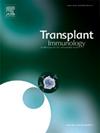Impacts of donor-specific anti-HLA antibodies on post-transplant clinical outcomes in hematopoietic stem cell transplantation: A systematic review and meta-analysis
IF 1.4
4区 医学
Q4 IMMUNOLOGY
引用次数: 0
Abstract
Background
Donor-specific antibodies (DSAs) are a major risk factor for adverse clinical outcomes in hematopoietic stem cell transplantation (HSCT). However, their clinical relevance remains controversial and unclear. This meta-analysis evaluated the impact of DSAs in HSCT.
Methods
This systematic review and meta-analysis compared outcomes between patients positive and negative for DSAs. Databases including PubMed, Embase, and Cochrane Library were searched for English-language studies published up to January 2025. Studies assessing DSAs and outcomes, including overall survival (OS), graft failure, poor graft function (PGF), poor engraftment rates, and graft-versus-host disease (GVHD). Pooled odds ratios and confidence intervals were calculated using fixed- or random-effects models.
Results
Thirty-two studies with 5555 patients with HSCT (557 DSA-positive, 4998 DSA-negative) were included. DSA positivity was considerably associated with increased risk of PGF, graft failure, and overall mortality. Additionally, patients with DSA-positive had lower OS. However, no notable associations were found with GVHD, neutrophil or platelet engraftment, relapse, or infections such as cytomegalovirus or Epstein-Barr virus. Study heterogeneity was moderate to high for several outcomes, necessitating the use of random-effects models.
Conclusion
DSAs are linked to poorer HSCT outcomes, particularly graft failure and reduced overall survival. Routine DSA screening and targeted interventions may improve outcomes.
供体特异性hla抗体对造血干细胞移植后临床结果的影响:一项系统综述和荟萃分析。
背景:供体特异性抗体(dsa)是造血干细胞移植(HSCT)不良临床结果的主要危险因素。然而,它们的临床相关性仍然存在争议和不清楚。本荟萃分析评估了dsa在HSCT中的影响。方法:本系统综述和荟萃分析比较了dsa阳性和阴性患者的结果。检索了PubMed、Embase和Cochrane Library等数据库,检索了截至2025年1月发表的英语研究。评估dsa和结果的研究,包括总生存期(OS)、移植物衰竭、移植物功能不良(PGF)、移植物不良植入率和移植物抗宿主病(GVHD)。合并优势比和置信区间采用固定或随机效应模型计算。结果:32项研究纳入了5555例HSCT患者(557例dsa阳性,4998例dsa阴性)。DSA阳性与PGF、移植物衰竭和总死亡率增加的风险显著相关。此外,dsa阳性患者的OS较低。然而,与GVHD、中性粒细胞或血小板植入、复发或感染(如巨细胞病毒或eb病毒)没有明显的关联。有几个结果的研究异质性为中等到高度,因此需要使用随机效应模型。结论:dsa与较差的HSCT结果有关,特别是移植物失败和总生存率降低。常规DSA筛查和有针对性的干预可能改善预后。
本文章由计算机程序翻译,如有差异,请以英文原文为准。
求助全文
约1分钟内获得全文
求助全文
来源期刊

Transplant immunology
医学-免疫学
CiteScore
2.10
自引率
13.30%
发文量
198
审稿时长
48 days
期刊介绍:
Transplant Immunology will publish up-to-date information on all aspects of the broad field it encompasses. The journal will be directed at (basic) scientists, tissue typers, transplant physicians and surgeons, and research and data on all immunological aspects of organ-, tissue- and (haematopoietic) stem cell transplantation are of potential interest to the readers of Transplant Immunology. Original papers, Review articles and Hypotheses will be considered for publication and submitted manuscripts will be rapidly peer-reviewed and published. They will be judged on the basis of scientific merit, originality, timeliness and quality.
 求助内容:
求助内容: 应助结果提醒方式:
应助结果提醒方式:


